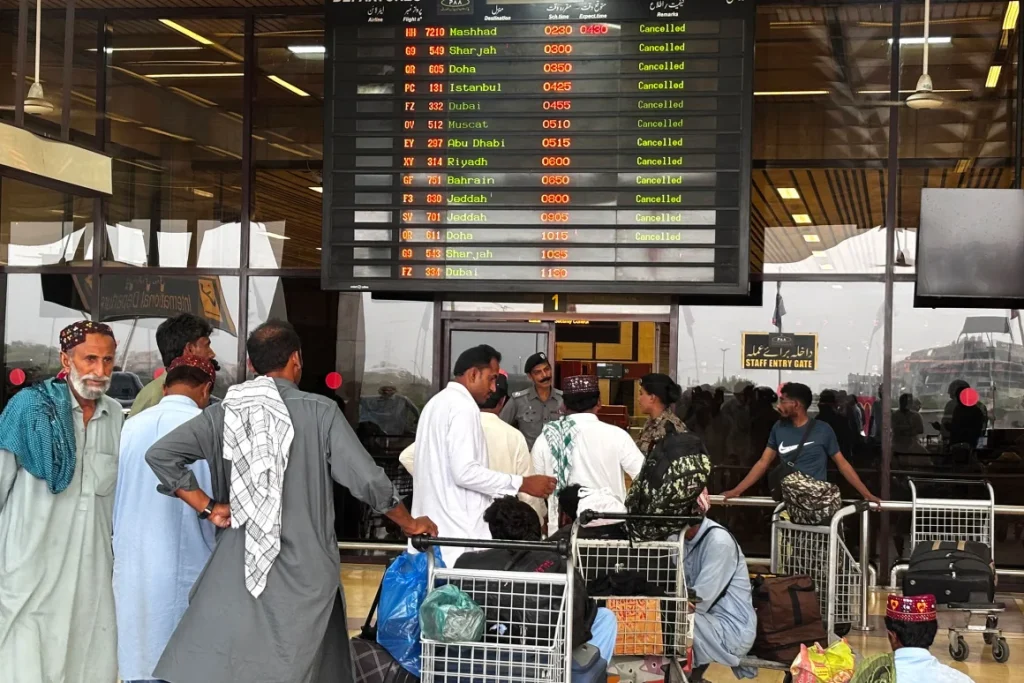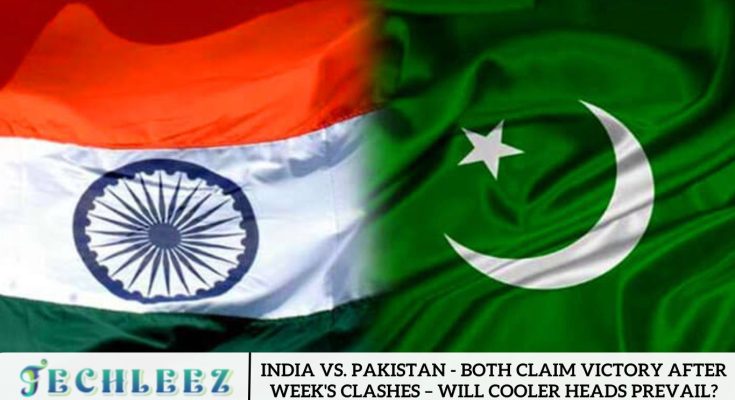This week’s violent clashes between India and Pakistan mark the most serious escalation in tensions between the two historic rivals in decades, leaving millions of people on both sides of the border anxious about what might unfold next.
Despite Pakistan’s vow to “avenge” India’s military strikes on its territory, the nation has refrained from retaliating in kind, and both countries have already claimed victory. However, hostilities continue to simmer.
On Wednesday, panic swept across both nations as New Delhi launched targeted military strikes on Pakistan, while Islamabad countered by claiming it had shot down Indian fighter jets.
By Thursday, Pakistan reported shooting down at least 25 Indian loitering munition drones overnight, calling it a serious provocation from New Delhi. The incident resulted in four Pakistani soldiers being wounded and one civilian killed. CNN has been unable to independently verify these claims and has reached out to the Indian Air Force and Ministry of Defense for comment.
The growing fear is that any further confrontational actions could quickly escalate into full-scale conflict.
Indian media expressed jubilation following Wednesday’s strikes, with one major English newspaper describing the military response as “strokes of justice.” The editorial commended the country’s “sharp” and “resolute” actions in response to the massacre of 26 people in Indian-administered Kashmir by militants. A headline from The Indian Express echoed this sentiment, declaring, “Justice Served.”
In Pakistan, Prime Minister Shehbaz Sharif’s public response to India’s military actions was equally defiant, as he vowed to “avenge” the deaths of 31 Pakistanis allegedly killed in India’s recent strikes. Despite this, Sharif also declared a victory for Pakistan after claiming its forces shot down Indian aircraft during the confrontation.
“It only took a few hours for the enemy to fall on its knees,” Sharif declared in a late-night address to the nation.
India, on the other hand, maintained that it had targeted “terrorist infrastructure” belonging to two Islamist militant groups – Lashkar-e-Tayyiba and Jaish-e-Mohammed – groups accused of orchestrating some of the deadliest attacks on Indian soil. According to New Delhi, the strikes did not target military infrastructure or result in civilian casualties, leaving open the possibility for both sides to de-escalate and avoid an all-out war.
One of India’s strikes hit deep within Pakistan’s Punjab province, marking the most significant attack on Pakistan’s undisputed territory since the 1971 war. Additional strikes targeted multiple locations within Punjab, a stronghold of Pakistan’s military and home to Sharif’s government. Pakistani officials reported that one of the strikes also hit a mosque, fueling widespread anger across the Muslim-majority country.
As tensions mount, the next move from Islamabad could determine the trajectory of the crisis.
“All eyes are on Pakistan,” said Michael Kugelman, a South Asia analyst based in Washington. “If Pakistan decides to save face by claiming victory—perhaps by pointing to the downing of Indian jets (which India has not confirmed)—there could be an off-ramp to de-escalation.”
However, Kugelman also warned that if Pakistan chooses to retaliate, the situation could rapidly spiral into full-scale conflict.
‘Something to lose’
Most analysts agree that the nuclear-armed neighbors, India and Pakistan, can no longer afford another war. The two nations have already fought three wars over the disputed Kashmir region—each claiming the entire territory while controlling a part of it. A fresh conflict between them could have catastrophic consequences, given the nuclear capabilities of both countries.
Since its creation seven decades ago during the partition of British India, Pakistan—home to 230 million people—has faced numerous challenges. These include political instability, a growing militant insurgency, devastating climate disasters, and an increasingly fragile economy. Any further escalation with India could overwhelm the nation’s already fragile state, with potentially disastrous effects not only for Pakistan but for the region as a whole.
The international community remains concerned that a new war between India and Pakistan could trigger a wider conflict, putting global peace and security at severe risk.
While India appears to be in a stronger position—its military is considered superior in conventional conflicts based on sheer numbers, and its economy is more than 10 times the size of Pakistan’s—India too has much to lose should tensions escalate further. According to Tanvi Madan, a senior fellow in the Foreign Policy program at the Brookings Institution, both nations are rational actors who would prefer to avoid a broader war.
“Largely on the basis of what we’ve seen in previous times, these are two rational actors who don’t want a broader war,” Madan explained, highlighting that neither country is likely to push for full-scale conflict, knowing the disastrous consequences it could bring.
India’s Prime Minister Narendra Modi has set his sights on elevating India’s global stature—seeking to host the Olympics and aiming to overtake China as the world’s leading manufacturing hub. An escalation with Pakistan would undermine these ambitions and could destabilize India’s rise on the global stage.
Moreover, India already faces significant security challenges, particularly along its contested borders with China. The geopolitical complexities and external security threats India faces further emphasize the high stakes of any conflict with Pakistan.
De-escalation or more to come?
India was quick to emphasize that its response to the April 22 massacre was “focused, measured, and non-escalatory.” The strikes, New Delhi insisted, were directly linked to the massacre of tourists in Indian-administered Kashmir. In an effort to avoid further escalation, Indian officials reached out to key international counterparts, including those in the United States, the Middle East, and Russia, “presumably to encourage international pressure on Pakistan to avoid escalation,” according to Nisha Biswal, Senior Advisor at The Asia Group.
Meanwhile, Pakistan’s leaders celebrated what they portrayed as a victory for the country’s air force, claiming that five Indian fighter jets were shot down during an hour-long aerial battle, with engagements taking place over distances exceeding 160 kilometers (100 miles). This military rhetoric from both sides, however, only adds to the heightened tensions and the ongoing uncertainty about how the conflict might unfold.

India has remained largely silent in response to Pakistan’s claims of shooting down Indian fighter jets, and has not acknowledged any aircraft losses. While Pakistan has yet to provide any evidence to substantiate its claims, a source from the French Ministry of Defense has indicated that at least one of India’s most advanced warplanes, a French-made Rafale fighter jet, was indeed lost during the aerial battle.
Should there be confirmed losses for India, Pakistan could still claim a victory, “even if the circumstances are murky,” according to Milan Vaishnav, a senior fellow and director of the South Asia Program at the Carnegie Endowment for International Peace. He added that this would allow Pakistan to claim it had imposed costs on Indian military targets, bolstering its narrative of success.
In response to any aggression from India, Pakistan’s powerful army general, Asim Munir, had already vowed to match it. Munir, known for his hardline stance on Indian Prime Minister Narendra Modi, is seen as more assertive than his predecessor, General Qamar Javed Bajwa.
Meanwhile, within Modi’s Hindu nationalist party, there has been growing pressure for a decisive military response against Pakistan, further complicating the situation.
Michael Kugelman, the South Asia analyst, stated that while the United States has historically played a role in de-escalating such crises, it’s uncertain how much influence the current U.S. administration is willing to exert. Kugelman also pointed out that China, despite calling for de-escalation, is unlikely to be an effective intermediary due to its fraught relations with India. The top diplomatic candidates for mediation are the Arab Gulf states—particularly Qatar, Saudi Arabia, and the UAE—due to their strong ties with both nations.
Qatar has already called for diplomacy in the hours following Wednesday’s strikes, underscoring the international push for a peaceful resolution.
Despite the international calls for restraint, most analysts believe there remains a potential off-ramp for both nations. However, the situation remains fluid and tense, with Kugelman describing it as “as unpredictable as it is dangerous—an unsettling combination.”
Frequently Asked Question
What caused the latest clashes between India and Pakistan?
The recent clashes were triggered by military strikes following the April 22 massacre in Indian-administered Kashmir. India launched targeted strikes on Pakistani territory, claiming they were in response to the killings, while Pakistan asserted that it shot down Indian fighter jets.
Who is claiming victory after the clashes?
Both India and Pakistan have claimed victory. India emphasized its measured, focused response, while Pakistan highlighted its success in downing Indian fighter jets.
What are the main concerns regarding further escalation?
Both countries possess nuclear capabilities, and further military confrontations could lead to catastrophic consequences. Analysts worry that any additional aggressive actions might escalate into a full-scale conflict.
How did India respond to Pakistan’s claims of shooting down fighter jets?
India has not officially acknowledged any aircraft losses and has refrained from commenting on Pakistan’s claims. There has been little public response from India regarding the downing of its fighter jets.
What role is international diplomacy playing in de-escalating the conflict?
Countries like the United States, Qatar, Saudi Arabia, and the UAE have urged both India and Pakistan to de-escalate tensions. The U.S. has historically intervened in such crises, while Qatar has called for diplomacy.
How has the Indian media responded to the strikes?
Indian media was euphoric, praising India’s military strikes as “justice served” in retaliation for the massacre of 26 people in Kashmir. The media’s portrayal has added to the sense of victory and national pride.
What is Pakistan’s stance on the recent military actions?
Pakistan’s government and military leaders have claimed a victory, especially regarding the downing of Indian fighter jets. Pakistan also accused India of escalating tensions with provocative military actions.
Conclusion
The recent clashes between India and Pakistan have once again highlighted the fragile and volatile nature of their relationship, particularly regarding the disputed region of Kashmir. With both nations claiming victory and ramping up military rhetoric, the situation remains tense and unpredictable. While India portrays its response as measured and non-escalatory, Pakistan sees its actions as a triumph, particularly in its claims of downing Indian fighter jets. However, the absence of verifiable evidence and the lack of acknowledgment from India leaves much in uncertainty.




